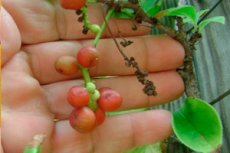New publications
A fruit used in Chinese medicine may help treat colon cancer
Last reviewed: 29.06.2025

All iLive content is medically reviewed or fact checked to ensure as much factual accuracy as possible.
We have strict sourcing guidelines and only link to reputable media sites, academic research institutions and, whenever possible, medically peer reviewed studies. Note that the numbers in parentheses ([1], [2], etc.) are clickable links to these studies.
If you feel that any of our content is inaccurate, out-of-date, or otherwise questionable, please select it and press Ctrl + Enter.

A new study shows that a polyphenol found in a plant used in Chinese medicine called schisandra may help treat colorectal cancer, especially in the later stages of the disease.
The compound is called schisandrin B and is found in the plant known as schisandra (schisandra chinensis, lemongrass, magnolia, wu wei zi, Sch B). The anti-cancer compound has shown particularly good results when acting on late-stage colon cancer cells.
According to the American Cancer Society, colorectal cancer is the second most common cause of cancer among men and women. Colorectal cancer is the third leading cause of death among men and the fourth among women.
Schizandrais a fruit used in traditional Chinese medicine to treat liver and stomach problems and as a tonic to increase vitality. The plant mainly grows in the forests of eastern Russia, northern China, Korea and in some places in Japan.
Previous researchtitle="A Comprehensive Review on Schisandrin B and Its Biological Properties - PMC">Suggested that schisandra may have anti-cancer properties against breast, liver, ovarian, gallbladder and stomach cancers.
For this study, the authors tested schizandra on human colon cancer tumor cells both in vitro and using animal models. Using various forms of molecular and cellular analysis, the researchers found that schisandra activated the stress response in cancer cells, leading to cancer cell death. These results may help explain the mechanism of the anti-cancer properties of this fruit.
"Schisandra was found to induce cell death via the apoptosis pathway - a programmatic process of cell death rather than a random process - in our cell and animal models of colorectal cancer," explained study author Dr. Hany El-Nezami, associate professor at the School of Biological Sciences, University of Hong Kong.
The researchers also identified the involvement of a specific protein, CHOP. When this protein was blocked, schizandra was less effective, indicating that the CHOP protein is somehow important to the fetus' ability to fight cancerous tumors.
In addition, schizandra showed very low toxicity to healthy cells compared to existing anticancer drugs.
Details of the study can be found on the journal page at aCS Pharmacology & Translational Science
